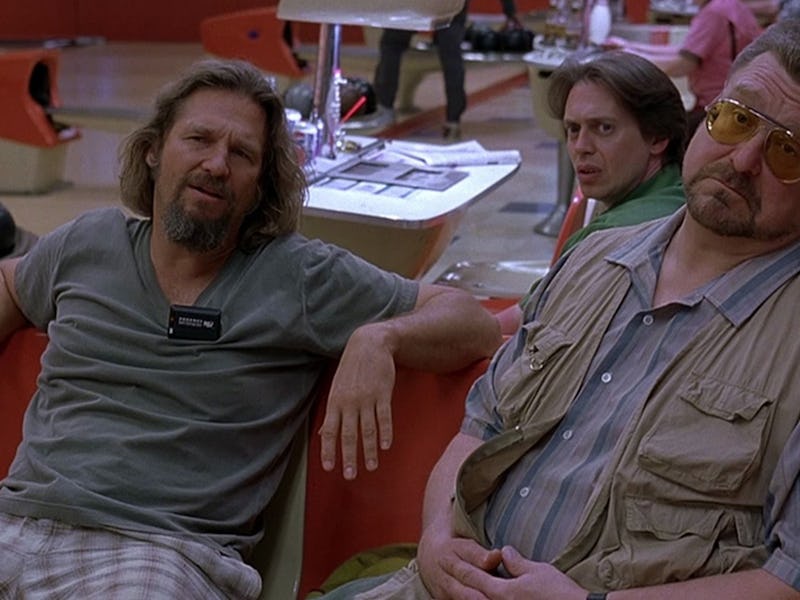25 Years Later, The Big Lebowski is an Elegy for the ‘60s — and a Compelling Mystery
Both the Dude and The Big Lebowski contain multitudes.

The Dude abides. That’s become a Zen koan as much as a movie line, and so it’s open to a variety of interpretations. From a character who’s ascended to stoner-icon status, it can represent the laid-back attitude of taking life as it comes, remaining open to new experiences and relationships. That perspective has turned the Dude into a cult figure, someone to emulate and admire. There’s a darker way to view it, though, and the great thing about the Dude is that he — and the movie he stars in — contains multitudes.
The Big Lebowski wasn’t initially a hit for filmmakers Joel and Ethan Coen, especially as a follow-up to their Oscar-winning Fargo. It received mixed reviews from critics and underperformed at the box office, but it’s since become a cultural touchstone, attaining a level of acclaim and adoration that goes beyond mere cult status. If it took a little time for audiences to fully appreciate The Big Lebowski, that may be because there are so many layers to appreciate.
That’s not to discount the surface pleasures of The Big Lebowski. It’s a hilarious shaggy-dog story that places Jeffrey “The Dude” Lebowski (Jeff Bridges) in the middle of a convoluted noir-style mystery influenced by hard-boiled LA classics like The Big Sleep. It begins when a pair of goons break into the Dude’s ratty apartment and soil his rug, all because they’ve confused him with another Jeffrey Lebowski (David Huddleston), a wealthy philanthropist. In his humble effort to be compensated, the Dude stumbles into a kidnapping plot involving Lebowski’s young wife Bunny (Tara Reid), and a range of oddball, only-in-LA characters.
The Dude’s odyssey qualifies The Big Lebowski as one of the all-time great stoner comedies, but it’s also a cleverly constructed mystery, demonstrating the Coens’ deep knowledge of, and love for, classic detective stories. It’s a key film in a subgenre that could be called dirtbag noir, movies about burnouts and slackers who wind up as private detectives by accident.
The Stranger labels the Dude “the man for his time and place.”
As dazed and confused as the Dude is throughout The Big Lebowski, the plot itself is intricate and meticulous, with, as the Dude says, “a lot of ins, a lot of outs.” The Dude himself is deceptively perceptive, solving aspects of the case almost without realizing it. When an out-of-town private eye played by Coens regular Jon Polito praises the Dude’s detective skills, it’s a funnier moment because he’s entirely right. The movie wouldn’t be nearly as entertaining if the mystery didn’t hold together, and the elegant plotting is one of the reasons why it’s so endlessly rewatchable.
It’s a pastiche of movies from the 1940s, but it’s very pointedly set in 1991, at the height of the Gulf War. The narrator known as the Stranger (Sam Elliott) describes the Dude as “the man for his time and place,” and the legacy of the 1960s and ‘70s weighs heavily on both the Dude and his best friend and bowling partner Walter Sobchak (John Goodman), a traumatized Vietnam War veteran.
The Dude abides.
As the Dude tells Lebowski’s avant-garde artist daughter Maude (Julianne Moore), he was a prominent activist in his youth, a member of the Seattle Seven and an author of the Port Huron Statement, a landmark political manifesto. Walter references Vietnam constantly, using it as both a crutch and a motivator. The Dude even notes that rival bowler Smokey (Jimmie Dale Gilmore) was a conscientious objector.
In its own way, then, The Big Lebowski is a clear-eyed elegy for 1960s counterculture, as stark as Hunter S. Thompson’s Fear and Loathing in Las Vegas. The Dude’s activist days are behind him and obscured by copious amounts of drugs, and he’s now content with a routine of “bowl, drive around, occasional acid flashback.” Disabled Korean War veteran Lebowski, who comes from an earlier, more conservative era, may turn out to be a bit of a fraud, but he’s not wrong when he yells at the Dude, “Your revolution is over, Mr. Lebowski. Congratulations, the bums lost!”
Now the Dude’s greatest act of protest is to object to the Eagles, the musical embodiment of 1960s rebellion transformed into 1980s conspicuous consumption. What’s left for the former rabble-rousers of the Dude’s generation is simply to abide, go with the flow, and regard the United States’ latest foreign conflict with bemused skepticism. If there’s a certain sadness to that attitude, the Dude never dwells on it, and neither do the Coens. They abide too, and the audience follows.